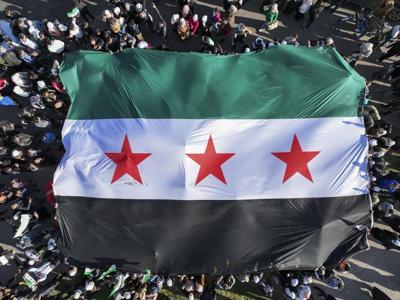The Boston Globe published this editorial on Dec. 12. It was distributed by the Associated Press.
The tyrant is gone. After 13 years of civil war and 50 years under the repressive Assad regimes, Syrians have every reason to celebrate.
Bashar al-Assad is safely ensconced in Russia, which had long supported his prison state with arms, fighter jets, and forces from the mercenary Wagner Group.
Meanwhile the Islamist Hayat Tahrir al-Sham rebel group, which led a lightning strike into Damascus, leading to the collapse of Assad├█┴─Í▒▓ąÖs government over the weekend, has taken control of the presidential palace and of the regime├█┴─Í▒▓ąÖs notorious prisons ├█┴─Í▒▓ąö freeing prisoners, most of them political prisoners, and exposing what amount to the torture chambers within.
So the joy in the streets as statues of the fallen dictator and his father are pulled down is real. The hopes of some of the thousands of displaced Syrians already flooding across the border to return home are also real. Some 6.2 million Syrians have fled their country during the civil war, according to the United Nations.
But we have seen it all before ├█┴─Í▒▓ąö more than a decade ago during what came to be known as the Arab Spring, which turned out to be less of a turning point in democratizing the region and more of a reason for autocrats and terrorists to divide and conquer.
Whether Syria can somehow become a functioning nation state is still very much in question. It could yet succumb to chaos or infighting among triumphant rebels. But this moment represents an opportunity for the United States and the international community to reach out, to engage, and to help free Syria from the more cynical ambitions of Assad├█┴─Í▒▓ąÖs patrons in Iran and Russia.
Ultimately Syria├█┴─Í▒▓ąÖs future will be in Syria├█┴─Í▒▓ąÖs hands. But constructive engagement isn├█┴─Í▒▓ąÖt out of the question.
HTS and its leader, Abu Mohammed al-Golani, a veteran of Al-Qaeda, have long been on the US terrorist and terrorist organization lists. But upon rolling into Damascus al-Golani dropped that nom de guerre and started using his real name, Ahmad al-Sharaa. Symbolic, yes, but he has, US officials agree, been saying all the right things ├█┴─Í▒▓ąö a process of ├█┴─Í▒▓ąťrehabilitation├█┴─Í▒▓ąŁ he embarked on years ago.
HTS, for example, announced an amnesty for members of the rank and file of the Assad government, and a general amnesty for military conscripts, many of whom shed their uniforms as the rebels approached the capital. But al-Sharaa also made clear in the statement that this did not extend to senior officials.
├█┴─Í▒▓ąťWe will not relent in holding accountable the criminals, murderers, and security and military officers involved in torturing the Syrian people,├█┴─Í▒▓ąŁ he said in a statement posted on Telegram.
Coincidentally the Justice Department announced the unsealing of an indictment Monday of two high-ranking members of Assad├█┴─Í▒▓ąÖs government, charging them with war crimes against American citizens and others. Both military officials, now missing, were accused of leading efforts to detain, torture, and imprison Syrians.
As HTS forces attempt to take over many of the normal functions of government in the areas it controls ├█┴─Í▒▓ąö patrolling streets and government buildings (including the newly vacated presidential palace), a caretaker government, headed by a HTS loyalist, was named to lead a transitional government until March.
That├█┴─Í▒▓ąÖs certainly a start. Meanwhile, other rebel factions ├█┴─Í▒▓ąö ranging from pro-democracy Kurds to the terrorist group Islamic State ├█┴─Í▒▓ąö continue to jostle for control in other parts of the country. Israel continues to launch bombing raids of Assad├█┴─Í▒▓ąÖs chemical weapons plants, naval vessels, and Russian-made bombers, which the Israeli government says it is doing to prevent those military assets from falling into the wrong hands amid the chaos. And while Turkey is facilitating the return of Syrian refugees, it├█┴─Í▒▓ąÖs also keeping a wary eye on the Kurds in Syria├█┴─Í▒▓ąÖs north, whom President Recep Tayyip Erdogan considers a security threat to his government ├█┴─Í▒▓ąö although they are allied with and trained by US forces, also in the region.
Yes, it├█┴─Í▒▓ąÖs complicated.
Those US forces, about 1,000 Special Operations troops, concentrated in the northeastern and central parts of Syria, continue to conduct airstrikes in the wake of Assad├█┴─Í▒▓ąÖs departure to keep Islamic State forces in check.
├█┴─Í▒▓ąťWe├█┴─Í▒▓ąÖre clear-eyed about the fact that ISIS will try to take advantage of any vacuum to re-establish its capability, to create a safe haven,├█┴─Í▒▓ąŁ President Biden said Sunday. ├█┴─Í▒▓ąťWe will not let that happen.├█┴─Í▒▓ąŁ
But Biden├█┴─Í▒▓ąÖs days are numbered and the message from President-elect Trump last week was hardly encouraging. ├█┴─Í▒▓ąťTHIS IS NOT OUR FIGHT. LET IT PLAY OUT. DO NOT GET INVOLVED,├█┴─Í▒▓ąŁ he wrote in a social media post.
It├█┴─Í▒▓ąÖs consistent with his 2019 withdrawal of most American troops from Syria ├█┴─Í▒▓ąö except for those Special Forces now on the ground.
But Trump might also be wise to relearn the lessons from the US troop withdrawal from Afghanistan, which he also initiated ├█┴─Í▒▓ąö and then roundly criticized Biden for following through on ├█┴─Í▒▓ąö complete with its disastrous consequences. A US military presence, however small, can make a difference, and American diplomats can help promote stability and democracy in the country while sidelining extremist groups.
Restoring diplomatic ties between the United States and Damascus and possibly removing al-Sharaa from the terrorist list are still a long way off. But that is precisely the kind of constructive engagement that could ├█┴─Í▒▓ąö if earned by a new Syrian government ├█┴─Í▒▓ąö change the tide in this particularly fraught region. Conversely, it would hardly be in American interests to ├█┴─Í▒▓ąťnot get involved├█┴─Í▒▓ąŁ if that opens the door for Islamic State to regain a foothold in Syria.
That the rebel victory represents a setback for Assad├█┴─Í▒▓ąÖs backers, Russia, Iran, and its client Hezbollah makes it good news ├█┴─Í▒▓ąö at least for now. Under the theory that ├█┴─Í▒▓ąťthe enemy of my enemy is my friend,├█┴─Í▒▓ąŁ there is far more to be gained by building toward a new relationship than by giving this new government a diplomatic cold shoulder.








